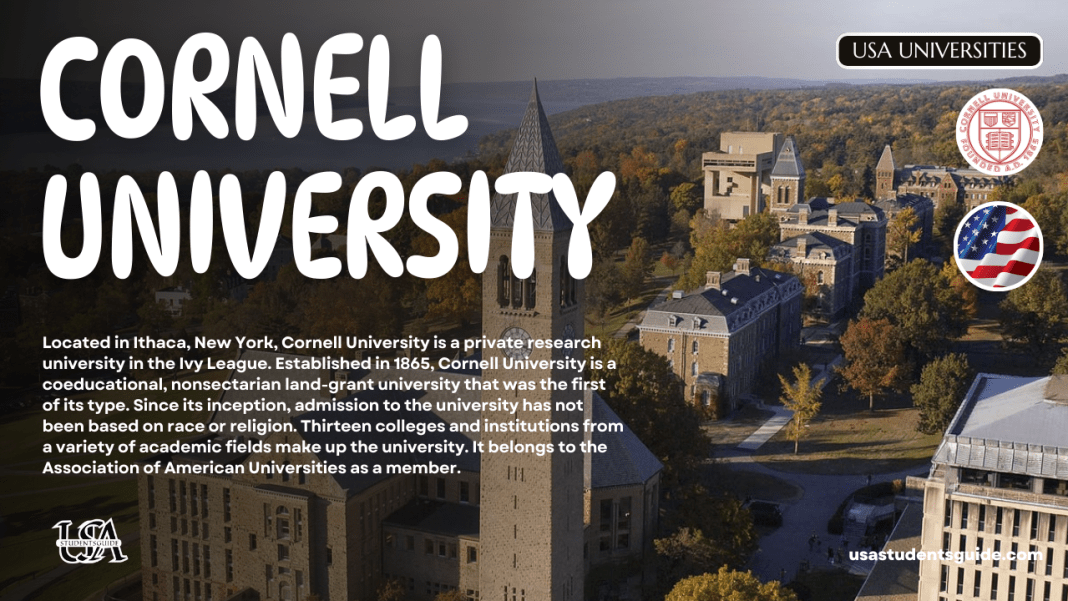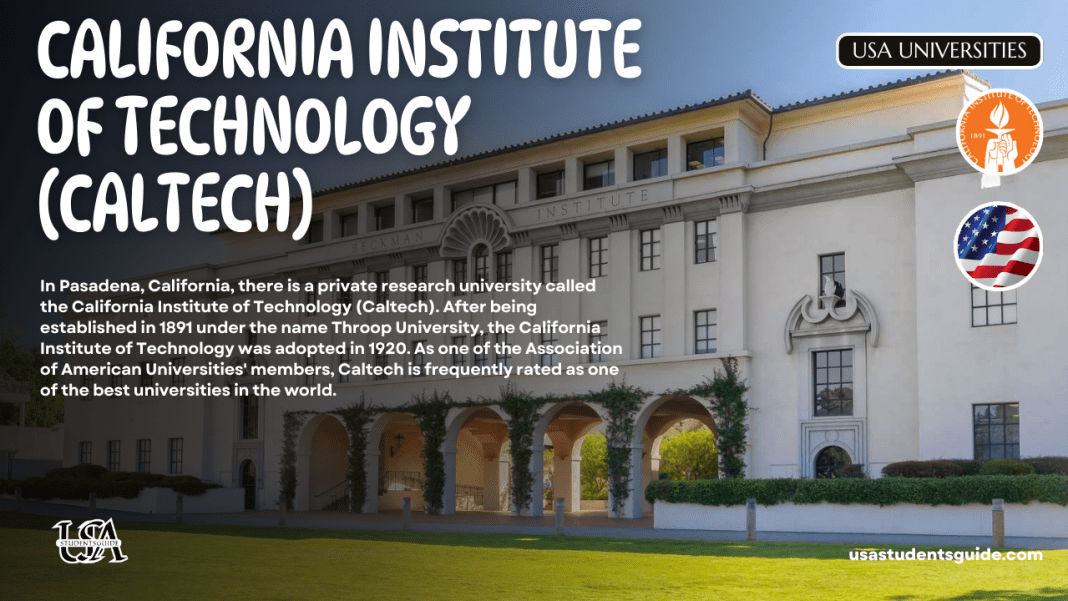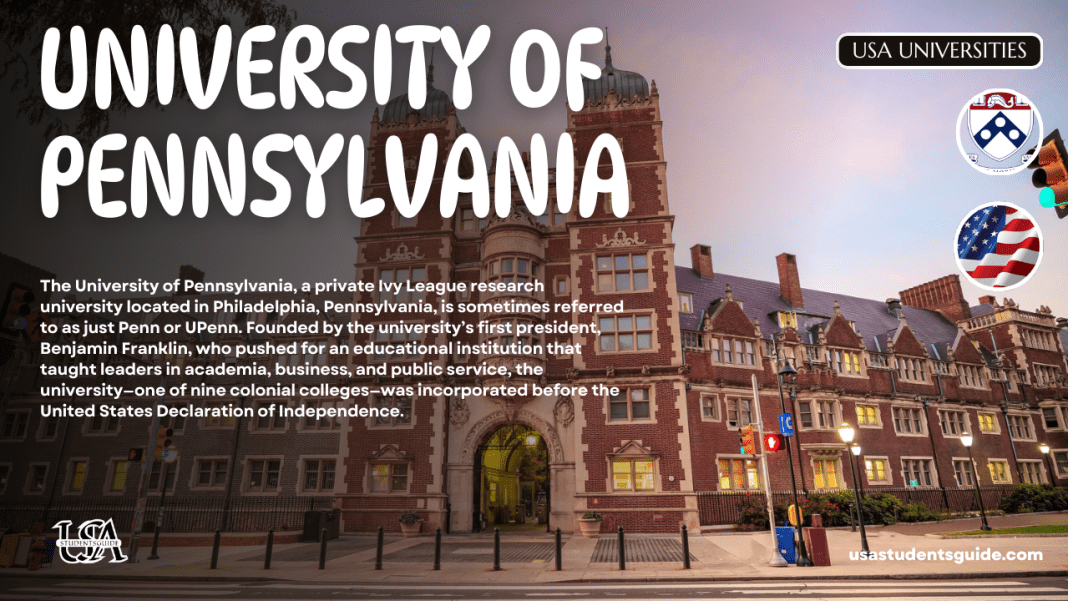Summary
- Founded: 1865
- Location: Ithaca, New York, USA
- Type: Private Ivy League research university
- Motto: “I would find an institution where any person can find instruction in any study.”
- Endowment: Over $10 billion (as of 2023)
- Campus Size: Approximately 2,300 acres
- Academic Structure: Seven undergraduate colleges and schools, including:
- College of Agriculture and Life Sciences
- College of Architecture, Art, and Planning
- College of Arts and Sciences
- College of Engineering
- School of Hotel Administration
- College of Human Ecology
- College of Veterinary Medicine
- Popular Programmes: Agriculture, Engineering, Hotel Management, Business, and Law
History and Background
Cornell University was founded in 1865 by Ezra Cornell and Andrew Dickson White with the intention of providing an inclusive education. The university was conceived as a place where anyone could pursue any field of study, emphasising both classical education and practical, hands-on training. This dual commitment to liberal and practical education set Cornell apart from its contemporaries.
Cornell opened its doors in 1868, quickly establishing itself as a pioneer in various fields, including agriculture and veterinary medicine. It was one of the first universities in the U.S. to offer a degree in Agriculture, reflecting its foundational mission to serve both society and individual students.
Location and Campus
Located in Ithaca, New York, Cornell’s campus overlooks Cayuga Lake and is known for its stunning natural beauty and diverse ecosystems. The university occupies approximately 2,300 acres, featuring a mix of historical and modern architecture.
The campus is home to notable landmarks, including:
- McGraw Tower, which houses the iconic chimes
- Cornell Botanic Gardens, encompassing over 4,000 species of plants
- Uris Library and Olin Library, serving as major academic resources
Cornell’s campus also features extensive research facilities, including laboratories, greenhouses, and the Cornell University Agricultural Experiment Station.
Academic Excellence
Cornell is known for its rigorous academic programmes and is consistently ranked among the top universities in the United States and worldwide. It operates under a unique model that combines the characteristics of a private university with a land-grant institution, emphasising both research and practical education.
With over 4,000 courses offered, Cornell has seven undergraduate colleges and schools, each with its own distinct academic identity. Highlights include:
- College of Agriculture and Life Sciences (CALS): Renowned for research in sustainable agriculture, food systems, and environmental science.
- College of Engineering: Known for its cutting-edge research in fields like computer science, mechanical engineering, and bioengineering.
- School of Hotel Administration: The first of its kind, it prepares students for leadership roles in the hospitality industry.
Cornell is also part of the Ivy League, known for its elite academic standards and emphasis on research, with faculty comprising several Nobel laureates, MacArthur Fellows, and National Academy members.
Student Life and Diversity
Cornell boasts a vibrant student body of approximately 23,000 students, with around 14,000 undergraduates and 9,000 graduate students. The university is committed to diversity and inclusion, with students from all 50 U.S. states and over 120 countries.
More than 1,000 student organisations offer a variety of activities, including:
- Academic and professional groups
- Cultural and ethnic organisations
- Sports teams and recreational clubs
The university also hosts numerous events throughout the year, such as Cornell Days, which celebrate campus culture, and performances at the Schwartz Centre for the Performing Arts.
Cornell’s commitment to inclusion is reflected in its various initiatives, including the Cornell University Diversity and Inclusion Initiative, which aims to foster a welcoming environment for all students.
Admissions and Scholarships
Cornell’s admissions process is highly competitive, with an acceptance rate of approximately 9% for the class of 2027. The university employs a holistic admissions approach, considering academic performance, extracurricular activities, essays, and personal recommendations.
Application requirements include:
- High school transcripts showcasing rigorous coursework
- Standardised test scores (SAT/ACT), though Cornell has adopted a test-optional policy for recent admissions cycles
- Letters of recommendation
- Personal essays
- A list of extracurricular activities and achievements
Cornell offers a range of financial aid options, ensuring that all admitted students can afford to attend. The university is committed to meeting 100% of demonstrated financial need for eligible students, providing both need-based aid and merit-based scholarships.
Cornell’s Contribution to Research and Innovation
Cornell is recognised as a leading research institution, with an annual research expenditure exceeding $1 billion. The university is involved in groundbreaking research across multiple disciplines, including:
- Agricultural sciences: Enhancing food production and sustainability practices.
- Engineering: Innovating in fields like robotics, renewable energy, and materials science.
- Life sciences: Advancing healthcare through research in medicine, veterinary science, and public health.
Key research centres include the Cornell University College of Veterinary Medicine, which is at the forefront of animal health research, and the Cornell Lab of Ornithology, renowned for its studies in bird conservation and ecology.
Cornell is also involved in numerous interdisciplinary collaborations, working with industries, government agencies, and other research institutions to address global challenges.
Notable Alumni
Cornell’s alumni network includes influential leaders across various fields. Notable alumni include:
- Ruth Bader Ginsburg: Former U.S. Supreme Court Justice
- Bill Nye: Science educator and television personality
- E. B. White: Author of Charlotte’s Web and Stuart Little
- Toni Morrison: Nobel Prize-winning author
- David Corn: Political journalist and author
- Mindy Kaling: Actress, writer, and producer
These individuals exemplify Cornell’s commitment to fostering talent that influences society and culture globally.
Global Impact and Rankings
Cornell is consistently ranked among the top 20 universities worldwide by various ranking organizations, including QS World University Rankings, Times Higher Education, and U.S. News & World Report. Its commitment to research, teaching excellence, and community engagement contributes to its global reputation.
The university’s programmes in agriculture, engineering, and hotel management are particularly well-regarded, and Cornell’s influence extends to significant partnerships and collaborations with international institutions, promoting education, research, and cultural exchange.
How to Apply as an International Student
International students applying to Cornell follow a similar admissions process to domestic students but must also meet additional requirements:
- English Proficiency: Non-native speakers must provide TOEFL or IELTS scores.
- Academic Records: Transcripts must be translated into English.
- Financial Aid: International students are eligible for need-based financial aid, which is awarded based on demonstrated need.
Key steps for applying:
- Complete the Common Application or Coalition Application.
- Submit SAT/ACT scores (optional in recent cycles).
- Provide two teacher recommendations and a school report.
- Write personal essays that showcase unique perspectives and experiences.
Why Cornell?
Cornell University is distinguished by its commitment to academic excellence, research innovation, and community engagement. The university’s emphasis on inclusivity and interdisciplinary collaboration prepares students to tackle global challenges effectively.
With its unique combination of rigorous academics, vibrant campus life, and access to leading-edge research opportunities, Cornell is an ideal environment for students seeking to make a meaningful impact in their fields and the world.
Conclusion
Cornell University remains a leader in education, research, and global engagement. Its tradition of inclusivity, commitment to practical and liberal education, and significant contributions to various fields make it a valuable institution in today’s interconnected world. Cornell’s emphasis on fostering innovative thinkers and responsible leaders ensures its continued impact on society for generations to come.



